Unsuccessful Interview Letter
[Your Name]
[Your Address]
[City, State, ZIP Code]
[Email Address]
[Phone Number]
[Date]
[Recipient's Name]
[Company Name]
[Company Address]
[City, State, ZIP Code]
Dear [Recipient's Name],
I hope this letter finds you well. I wanted to extend my sincere gratitude for considering my application and taking the time to interview me for the [Position Name] at [Company Name]. It was a pleasure to meet with you and learn more about your team and the exciting opportunities within your organization.
I would like to express my utmost appreciation for the effort you and your team put into the interview process. I found our discussions about the role and the company's goals to be insightful and engaging. I was truly impressed by the professionalism and enthusiasm demonstrated by everyone I interacted with during my time at [Company Name].
However, I regret to inform you that after careful consideration and reflection, I have decided to withdraw my application for the [Position Name]. This decision was not made lightly, as I have a great deal of respect for [Company Name] and its mission. After much thought, I have concluded that the role may not be the best fit for my skills and career aspirations at this time.
I sincerely appreciate your understanding of my decision. It was not an easy one, given the positive impression I had of [Company Name] and its dedicated team. I hope that this decision will allow you to continue your search for the ideal candidate who can contribute effectively to your company's success.
Thank you once again for the opportunity to interview with [Company Name]. I genuinely enjoyed our discussions and gained valuable insights into your industry. I hope our paths cross again in the future, and I wish [Company Name] continued growth and prosperity.
Warm regards,
[Your Name]
Formal Unsuccessful Interview Letter
Subject: Outcome of Your Recent Interview
Dear [Candidate Name],
Thank you for taking the time to attend the interview for the position of [Position Name] at [Company Name]. We appreciate your interest and the effort you put into the process.
After careful consideration, we regret to inform you that we will not be moving forward with your application at this time. The selection was highly competitive, and while your skills are impressive, we have chosen a candidate whose experience more closely aligns with the role requirements.
We encourage you to apply for future openings for which you may be suitable. We wish you the very best in your career pursuits.
Sincerely,
[Your Name]
[Designation]
[Company Name]
Casual Unsuccessful Interview Email
Subject: Interview Result – [Position Name]
Hi [Candidate Name],
Thanks again for interviewing with us. Unfortunately, we’ve decided to move forward with another candidate whose profile fits the role more closely.
We really appreciate your time and interest, and we hope to keep your resume on file for future opportunities.
Best regards,
[Your Name]
[Company Name]
Heartfelt Unsuccessful Interview Letter
Subject: Interview Outcome
Dear [Candidate Name],
We truly appreciate the effort and enthusiasm you demonstrated during your interview for the [Position Name]. It was a pleasure getting to know you and learning about your experiences.
After careful deliberation, we regret to inform you that you have not been selected for this role. Please know that this decision was not easy given the strong pool of candidates.
We hope you will consider applying for future positions at [Company Name]. Thank you for your interest and dedication.
Warm regards,
[Your Name]
[Designation]
[Company Name]
Quick Rejection Email
Subject: Interview Outcome – [Position Name]
Hello [Candidate Name],
Thank you for interviewing with us. Unfortunately, you were not selected for the role. We appreciate your interest and wish you success in your future endeavors.
Best,
[Your Name]
[Company Name]
Professional Detailed Rejection Letter
Subject: Your Interview with [Company Name]
Dear [Candidate Name],
Thank you for participating in the interview process for the [Position Name] role. We were impressed with your qualifications and experience.
After thorough evaluation, we have decided to proceed with another candidate whose skills and experience better match our current needs. We appreciate your efforts and encourage you to apply for future openings.
Please feel free to reach out if you would like feedback on your interview to help with your professional growth.
Sincerely,
[Your Name]
[Designation]
[Company Name]
Informal Friendly Rejection Message
Subject: Interview Update
Hi [Candidate Name],
We really enjoyed speaking with you about the [Position Name] position. Unfortunately, this time, we went with another candidate.
Thanks again for your time, and we hope to see your application again for future opportunities!
Cheers,
[Your Name]
Preliminary Rejection Notice
Subject: Interview Status – [Position Name]
Dear [Candidate Name],
Thank you for interviewing with us. At this stage, we wanted to let you know that you are not moving forward in the selection process. We appreciate your interest and effort.
We encourage you to stay connected with our career opportunities.
Best regards,
[Your Name]
[Company Name]
What is an Unsuccessful Interview Letter and Why it is Sent
An unsuccessful interview letter is a formal or informal communication sent to candidates who have not been selected for a job after an interview.
Purpose of the letter:
- To notify the candidate about the outcome of their interview.
- To maintain professionalism and positive employer branding.
- To provide closure for the candidate and allow them to seek other opportunities.
Who Should Send an Unsuccessful Interview Letter
- Hiring managers or interview panel members.
- Human Resources department.
- Recruiters responsible for the selection process.
- In some cases, department heads for senior roles.
Whom Should the Letter Be Addressed To
- The candidate who attended the interview.
- If multiple interviews occurred, the candidate must receive a single consolidated communication.
- Optionally, CC the recruiter or HR personnel for records.
When Should an Unsuccessful Interview Letter be Sent
- Immediately after finalizing the candidate selection.
- Ideally within 1–3 days of the decision to avoid unnecessary delays.
- Can be sent provisionally if a candidate is under consideration but another has been selected.
How to Write and Send an Unsuccessful Interview Letter
- Begin with a polite greeting addressing the candidate by name.
- Thank the candidate for their time and effort.
- Clearly state that they were not selected.
- Optionally provide brief feedback or encouragement for future applications.
- Use appropriate tone based on the formality of the organization.
- Send via email or postal letter as per company norms.
Requirements and Prerequisites Before Sending
- Ensure the final selection decision is confirmed.
- Verify the candidate’s correct contact details.
- Check for any confidentiality or legal requirements.
- Have HR approval for wording if company policy mandates.
Formatting Tips for an Unsuccessful Interview Letter
- Length: Concise and professional (1–2 paragraphs for email, up to one page for printed letter).
- Tone: Professional, polite, and empathetic.
- Style: Formal for official letters, casual for friendly workplaces.
- Wording: Avoid harsh or negative language; focus on appreciation and encouragement.
- Mode: Email is common; letter for high-level or formal roles.
Common Mistakes to Avoid
- Delaying the notification too long.
- Using impersonal language or generic templates.
- Providing misleading feedback or false hope.
- Forgetting to address the candidate properly.
- Failing to follow company policy on communication.
Elements and Structure of an Unsuccessful Interview Letter
- Subject line indicating the outcome.
- Salutation addressing the candidate by name.
- Thank you for participation and effort.
- Clear statement of non-selection.
- Optional feedback or encouragement for future applications.
- Closing and sender's details.
FAQ About Unsuccessful Interview Letters
Q: Should feedback always be included?
A: Not mandatory, but providing constructive feedback can enhance employer branding.
Q: Is email sufficient or should I send a letter?
A: Email is acceptable for most roles; printed letters may be used for senior or executive positions.
Q: Can I reuse a template for multiple candidates?
A: Yes, but customize the candidate’s name and role to maintain professionalism.
Tricks and Tips for Sending Unsuccessful Interview Letters
- Send promptly to show professionalism.
- Keep language polite and neutral to avoid negative impressions.
- Use templates but personalize each letter.
- Include encouragement to apply for future roles.
- Maintain records for HR compliance.
After Sending / Follow-Up Actions
- Confirm email delivery or receipt of letter.
- Update internal HR records and candidate status.
- Be prepared to respond to any candidate queries or requests for feedback.
- Maintain confidentiality regarding the selection decision.
Pros and Cons of Sending an Unsuccessful Interview Letter
Pros:
- Maintains professional image of the company.
- Provides closure to candidates.
- Encourages future applications.
Cons:
- May trigger follow-up requests for feedback.
- Can disappoint candidates if not worded sensitively.
- Extra administrative work for HR teams.
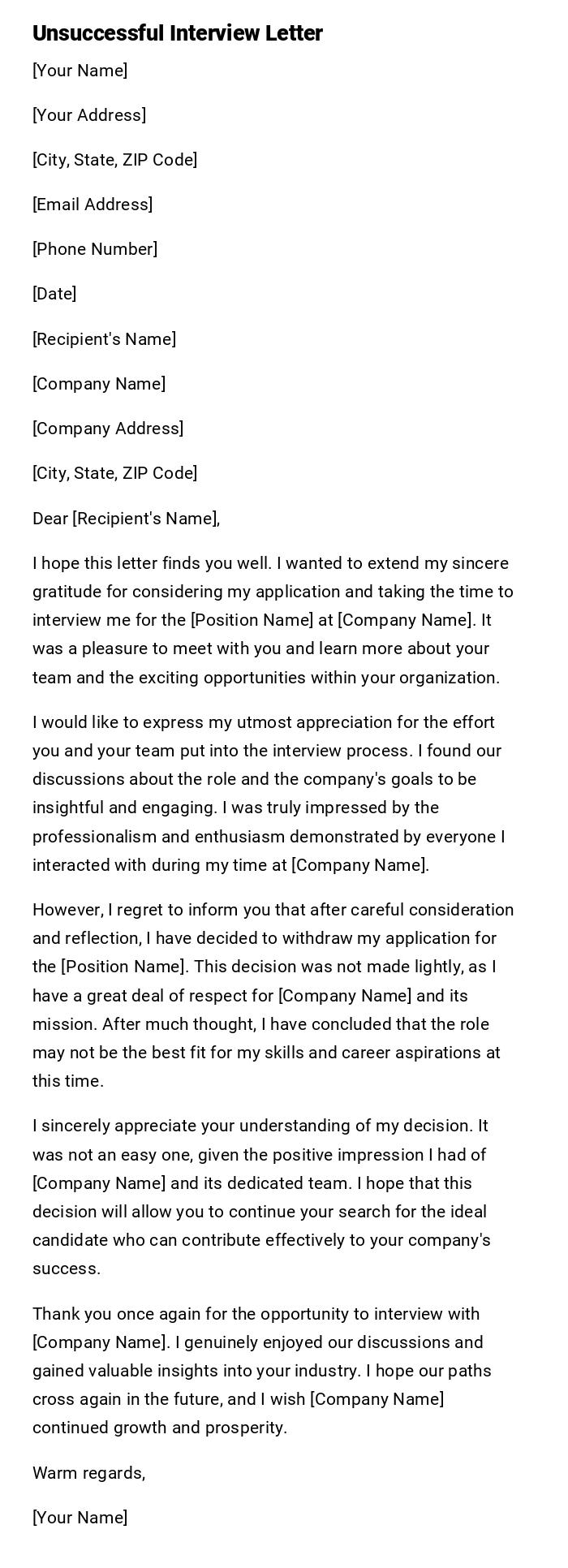
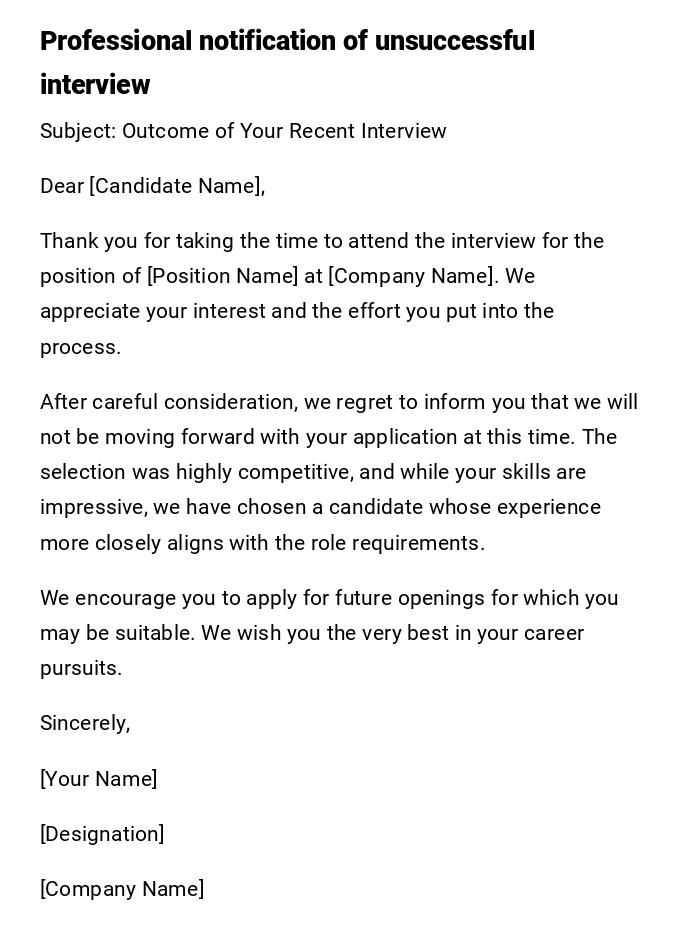
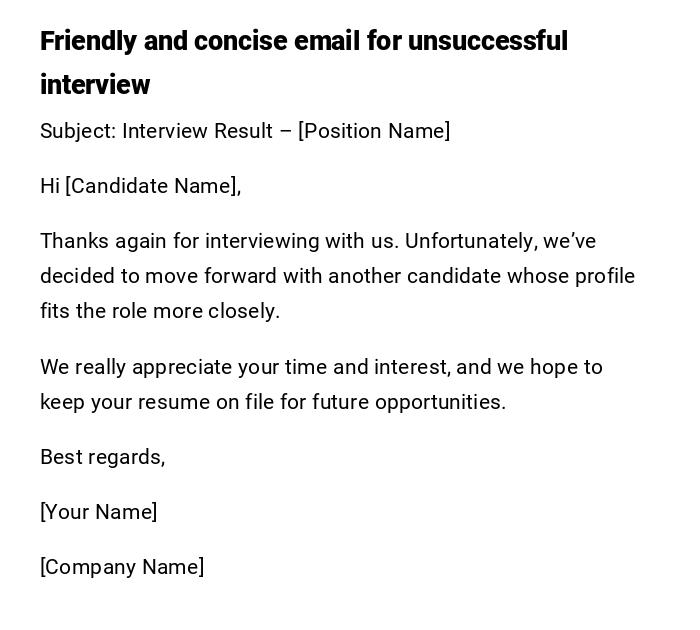
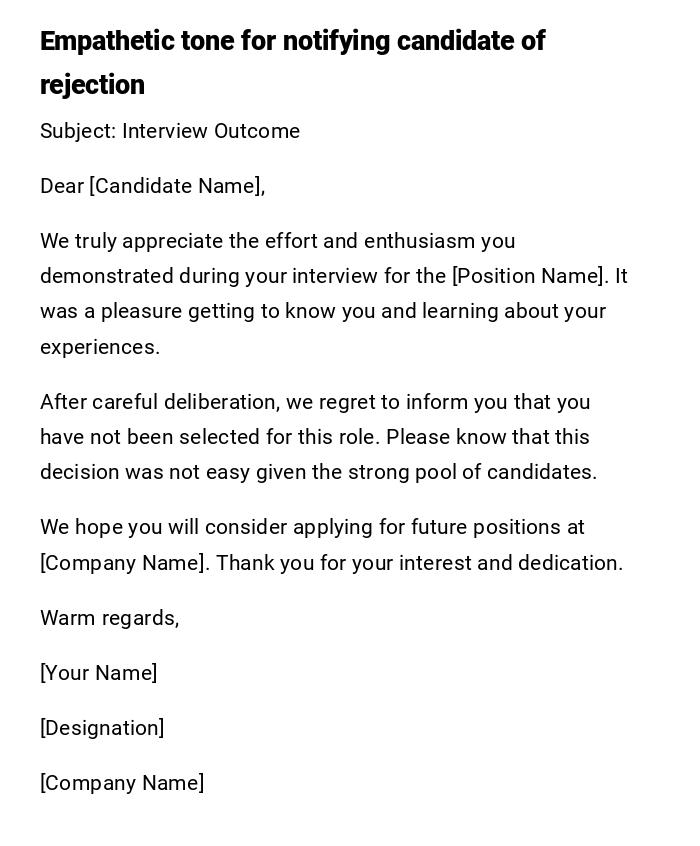
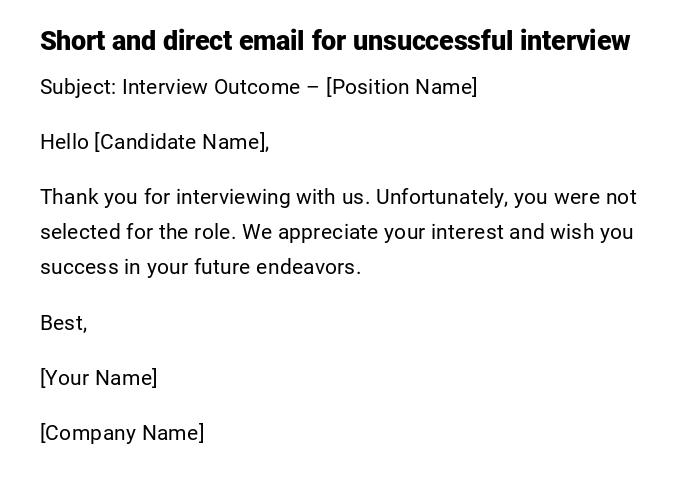
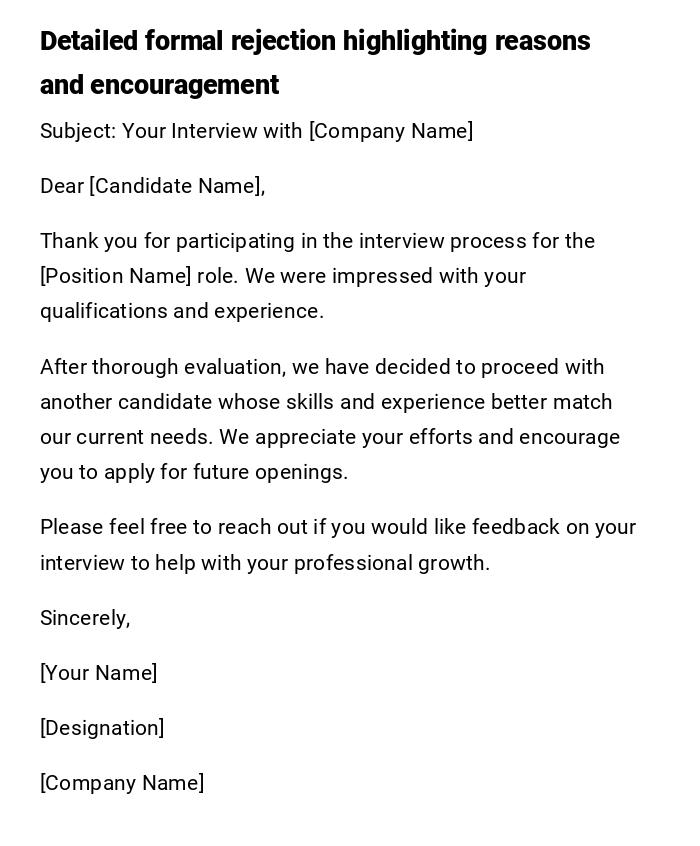
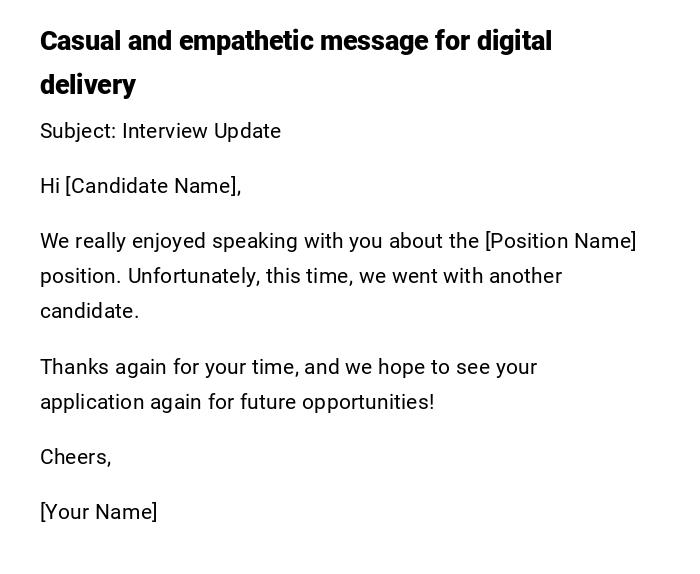
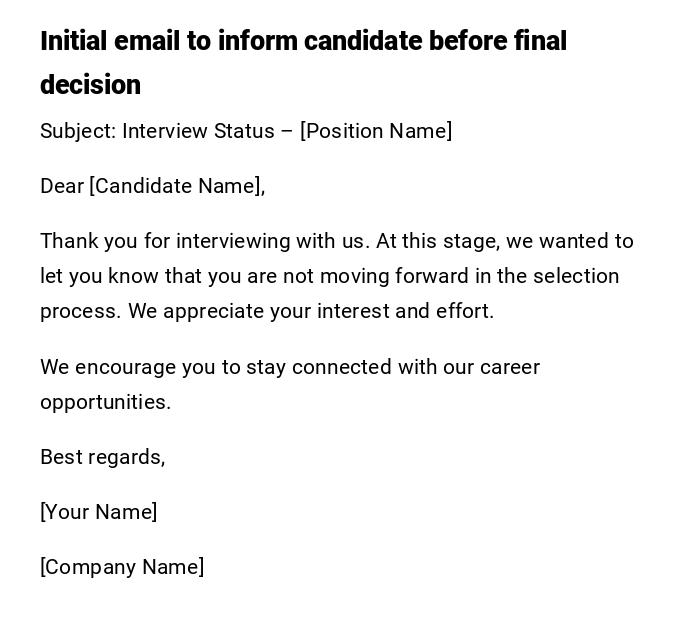

 Download Word Doc
Download Word Doc
 Download PDF
Download PDF